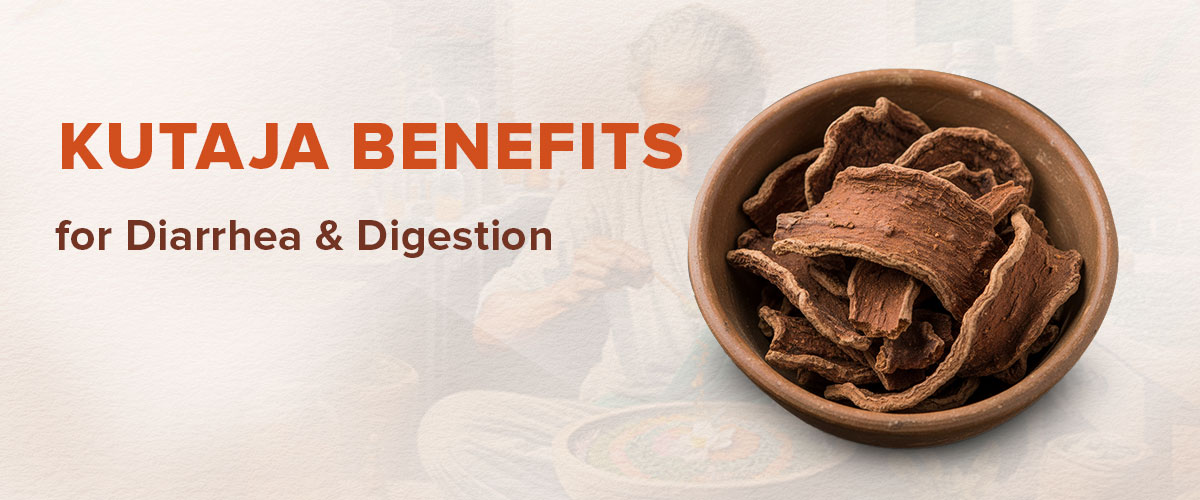Tulsi: Benefits, Uses, and Healing Properties

Tulsi (Ocimum sanctum, Tulasi in Sanskrit) has been a pillar of Ayurvedic healing for thousands of years. That is why it is rightly called the "Queen of Herbs."
As per ancient Ayurvedic texts like Charaka Samhita and Sushruta Samhita, Tulsi was used as a daily herb to help with breathing issues, digestion, immunity, and general health. Ayurvedic doctors think of it as a Rasayana, which is a herb that helps you regain strength and energy as you get older.
Tulsi's benefits are still very important today, when our lives are getting busier and more stressful. New research backs up its uses. A recent randomised clinical trial, for instance, found that people who took Tulsi extract twice a day for eight weeks slept better and felt calmer, as shown by both subjective scores and lower cortisol levels.
What is Tulsi & Its Ayurvedic Properties?
Holy basil, or tulsi, is a strong healing plant that helps your health in a natural way. Tulsi is good for your digestion, immunity, and general health because it helps your body stay in balance, gets rid of toxins, and boosts your immune system. Let's see what Ayurveda says about its nature.
- Taste (Rasa): Tulsi tastes both strong (spicy) and bitter. If you have chewed on fresh Tulsi leaves, you might have noticed that sharp, slightly bitter kick. This flavour helps get rid of toxins and extra mucus in your body.
- Traits (Guna): Tulsi improves your digestion and helps absorb extra moisture or mucus in your body. That's why Tulsi is good for treating flu, especially when it's monsoon season.
- Strength (Virya): Tulsi has a heating effect (ushna virya). Tulsi can help if you often feel cold, tired, or bloated by warming up your body and making your digestion and circulation better.
- Post-Digestive Effect (Vipaka): Tulsi leaves a strong smell (katu vipaka) in your body after you digest it. This helps get rid of toxins (Ama), keep your gut clean, and keep your metabolism strong.
Tulsi Benefits for Your Health
Tulsi is one of those rare herbs that supports your health on many levels. From daily immunity to long-term stress relief, it has something to offer everyone. Here are some of the most trusted benefits of tulsi:
Boosts Immunity
Ayurvedic View: Tulsi is known as a Rasayana herb in Ayurveda, which means it strengthens your body’s defense system and improves Ojas (your immunity and vitality). It removes toxins, balances Kapha dosha, and keeps you protected during seasonal changes.
Modern View: Tulsi has natural antioxidants and compounds like eugenol that help fight bacteria, viruses, and other infections. Studies show that Tulsi can increase immune cell activity, making it easier for your body to stay healthy year-round.
Helps Keep Lungs Healthy
Ayurvedic View: Tulsi is good for coughs, colds, and asthma. Its warm, sharp qualities help clear mucus and make breathing easier by balancing out too much Kapha and Vata in the lungs.
Modern View: Tulsi is a natural expectorant and bronchodilator, according to modern science. When used regularly in tea or kadha, it can help with bronchitis, asthma, or the common cold by reducing inflammation in the airways.
Lowers Stress and Anxiety
Ayurvedic View: The Ayurvedic view is that Tulsi calms your mind by balancing Vata, which is often what makes people anxious and restless. It also helps you feel more stable and clear over time.
Modern View: Adaptogens are natural herbs that help your body deal with stress. Tulsi is one of these herbs. It lowers cortisol, the stress hormone, and helps you feel better, sleep better, and focus better. Some people feel better just by drinking Tulsi tea every day.
Helps with Diabetes Control
Ayurvedic View: Tulsi helps get rid of Ama (toxins from bad digestion), makes digestion stronger, and balances Vata, which are two of the main causes of Madhumeha (diabetes) in Ayurveda.
Modern View: Tulsi may help lower blood sugar levels by making your pancreas more sensitive to insulin and protecting it. It also helps keep the liver and kidneys healthy, which is important for people with diabetes.
Tulsi for Specific Health Conditions
Tulsi can also help you deal with some health issues naturally. This is how it helps with some common problems.
Tulsi for the Flu and Fever
Tulsi is like your body's natural defence when you have a fever or the flu. It helps your body sweat out the fever, fight off infections, and get rid of toxins. Ayurveda often uses it in homemade kadhas (herbal decoctions) to cool down the body and speed up healing.
Tulsi for High Blood Sugar and Diabetes
If you have high blood sugar, tulsi can help you. Ayurveda says that Tulsi helps with digestion, gets rid of toxins, and balances Vata, which are all things that can lead to diabetes (Madhumeha). Recent studies show that Tulsi can help lower blood sugar by making your pancreas stronger and more sensitive to insulin.
Tulsi for a Healthy Heart
Tulsi may help if you have high cholesterol or heart problems caused by stress. Its antioxidants lower oxidative stress and inflammation, and its calming effect lowers cortisol, which is the hormone that causes stress. Ayurveda says that it helps keep the heart healthy by getting rid of Ama and balancing the doshas.
Tulsi for Mental Clarity and Stress
Are you feeling mentally tired or anxious? Tulsi is adaptogenic, which means it can help calm your nerves. Ayurveda says to use it to balance Vata, which is connected to stress, overthinking, and not getting enough sleep. Drinking tulsi tea at night is a simple way to calm your mind.
Who Should Use Tulsi?
Tulsi is a useful herb that almost everyone can use in some way. This is how it helps people of different ages and health needs.
Tulsi for Women
Tulsi can help you if you're a woman who has to balance work, home, and health. It helps you deal with stress, keeps your hormones in check, and boosts your immune system. Some women drink Tulsi tea to ease menstrual cramps or to keep their energy up during the day. It also helps with mood swings, especially during PMS or menopause, because it calms the mind.
Tulsi for Kids
Yes, Tulsi is safe for kids, but only in small amounts. If your child has a cough, cold, or mild fever, you can give them Tulsi tea or a mix of Tulsi and honey. It strengthens their immune systems and helps keep them from getting sick in the winter. Before giving Tulsi to kids under 10 on a regular basis, be sure to talk to an Ayurvedic doctor.
Tulsi for Elderly People
Your body needs more help to fight infections, digest food better, and stay mentally sharp as you get older. Tulsi is a great herb for older people because it helps their lungs, lowers stress, and boosts their immune system. It can also help with lifestyle problems like diabetes, high blood pressure, or anxiety when used regularly. This makes it a gentle daily tonic for healthy ageing.
Can Tulsi Be Taken with Other Medicines?
Tulsi is a natural herb, but that doesn't mean you can mix it with all of your medicines without worrying about safety. If you're already taking some medicines on a regular basis, you should be careful.
For instance, if you take diabetes medicines, Tulsi might lower your blood sugar even more, which could make you feel weak or dizzy. Blood pressure medicines are the same way. Tulsi may make them more effective and lower your BP more than it needs to. Tulsi may also affect hormone levels if you take thyroid medication, but there isn't much research on this yet.
So don't guess if you're getting treatment for a health problem. To stay safe and get the most out of both modern and Ayurvedic care, talk to a Jiva certified doctor first.
Is Tulsi Safe? Who Should Avoid It?
Tulsi is generally safe when you take it in small, daily amounts, like in tea, kadha, or a few fresh leaves. Most people can enjoy its benefits without any trouble. But like anything else, too much of it or using it the wrong way can cause problems.
Possible Side Effects of Tulsi
- Tulsi can sometimes cause mild stomach upset.
- It can cause a drop in blood pressure or blood sugar.
- It can cause allergic reactions in some people, such as rashes or itching.
Stop using it and call your doctor if you see any of these signs.
Tulsi vs Other Ayurvedic Herbs
Tulsi is powerful, but so are other Ayurvedic herbs. To help you understand how Tulsi compares with some of them, here is a simple comparison.
Tulsi vs Brahmi
|
Feature |
Tulsi (Holy Basil) |
Brahmi (Bacopa monnieri) |
|
Best Known For |
Boosting immunity, fighting infections, calming stress |
Improving memory, focus, and calming the mind |
|
Nature (Heating/Cooling) |
Heating |
Cooling |
|
Effect on Mind |
Reduces anxiety, lifts mood |
Calms nervous system, supports learning |
|
Effect on Body |
Supports lungs, heart, and digestion |
Reduces fatigue from mental work |
Tulsi vs Shilajit
|
Feature |
Tulsi (Holy Basil) |
Shilajit (Mineral Resin) |
|
Best Known For |
Building immunity, stress relief, respiratory health |
Increasing strength, stamina, and energy |
|
Nature (Heating/Cooling) |
Heating |
Heating |
|
Effect on Mind |
Relieves anxiety, promotes clarity |
Enhances mental alertness and resilience |
|
Effect on Body |
Fights infections, supports lungs and heart |
Builds physical strength and supports metabolism |
Conclusion
Tulsi, one of nature's most powerful healers, may already be in your kitchen or garden. Ayurveda has used this simple herb for thousands of years to boost your immune system and calm your stress. But just like every one of us is different, every remedy works best when it is made just for you.
That's why it's important to get help from an Ayurvedic expert. It's better to consult someone who knows your body type, your doshas, and your health goals if you want to add Tulsi to your daily routine.
For personalised advice on any health issues you are facing, call our Jiva experts today at 0129-4264323.
FAQs
What are the benefits of Tulsi?
Tulsi boosts your immune system, helps you fight coughs and colds, lowers stress, helps your digestion, and even keeps your heart and lungs healthy. It's also known to relax your mind and protect your body from infections naturally.
What is the best use for Tulsi?
You can use Tulsi when the seasons change, when you're stressed, or when your body feels weak. It is most well-known for boosting the immune system, clearing the lungs, and helping the body deal with stress, both physical and mental.
How often should you eat Tulsi?
You can eat 2–3 fresh Tulsi leaves in the morning, drink Tulsi tea, or put it in your kadha. You can also get tulsi capsules or drops, but it's best to talk to an Ayurvedic doctor before using them every day.
What vitamin does Tulsi have?
Tulsi has a lot of calcium, zinc, and iron, as well as vitamins A and C. These nutrients help your skin, bones, immune system, and overall energy levels.
Is it safe to take Tulsi while pregnant?
Don't use Tulsi if you're pregnant or breastfeeding unless a Jiva doctor tells you to. Talk to a Jiva certified Ayurvedic doctor before you start taking any herbs, even if they are natural.



 Prev
Prev





























